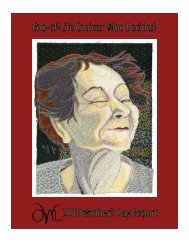elder abuse: a women's issue - OWL-National Older Women's League
elder abuse: a women's issue - OWL-National Older Women's League
elder abuse: a women's issue - OWL-National Older Women's League
Create successful ePaper yourself
Turn your PDF publications into a flip-book with our unique Google optimized e-Paper software.
we can no longer ignore the reality that <strong>elder</strong> <strong>abuse</strong> isprevalent within our society and we must do somethingto address it. Enacting the Elder Justice Act is the firststep.Senior citizens cannot wait any longer for thislegislation to pass. Getting this bill signed into lawcontinues to be one of my top priorities. Therefore, Iurge my colleagues to cosponsor the Elder Justice Actand support the passage of this legislation.Our seniors deserve no less.Mr. KOHL. Mr. President, I wish today to express mysupport for the Elder Justice Act of 2009. As in previousyears, I am proud to be an original cosponsor. I wish tothank my colleague, Senators Hatch, Lincoln, and Snowefor their leadership to address the often-hidden scourgeof <strong>elder</strong> <strong>abuse</strong>. For years, Congress has failed to takeconcrete action to address the consequences of <strong>elder</strong><strong>abuse</strong>, and that must change.The Elder Justice Act takes several important stepsto help protect our vulnerable <strong>elder</strong>s. First, it boostsfunding for the long-term care ombudsman program,which is the chief source of advocacy for individualswho live in nursing homes and assisted living facilities.The bill would advance the understanding of how toprosecute and address <strong>elder</strong> <strong>abuse</strong> by providing fundsto focus on and develop the forensics of <strong>elder</strong> <strong>abuse</strong>.In addition, it elevates the importance of <strong>elder</strong> justice<strong>issue</strong>s by creating a coordinating council of Federalagencies that will make policy recommendations andsubmit reports to Congress every 2 years. The legislationprovides funding for adult protective services programsand improves training and working conditions for longtermcare professionals.We must also act to prevent <strong>abuse</strong> of our <strong>elder</strong>swhenever and wherever possible. The Patient Safety andAbuse Prevention Act, which I recently reintroducedwith my colleague, Senator Collins, would do muchto prevent physical, emotional and financial <strong>abuse</strong>by providing States with the resources they need tosignificantly improve background check screeningprocesses for vulnerable populations, including frail<strong>elder</strong>s and individuals with disabilities. We know fromthe results of a 3-year pilot program that thousands ofpredators can be eliminated from the long-term careworkforce that serves <strong>elder</strong>s simply by improving andtightening screening standards.In closing, I urge my colleagues to support boththe Elder Justice Act and the Patient Safety andAbuse Prevention Act. Thousands of individuals witha history of substantiated <strong>abuse</strong> or a criminal recordare hired every year to work closely with exposed anddefenseless seniors within our Nation’s nursing homesand other long-term care facilities. Because the currentsystem of State-based background checks is haphazard,inconsistent, and full of gaping holes, predators canevade detection throughout the hiring process, securingjobs that allow them to assault, <strong>abuse</strong>, and steal fromdefenseless <strong>elder</strong>s.I thank Senators Hatch, Lincoln, and Snowe for theircommitment to the cause of <strong>elder</strong> justice. I look forwardto working with my colleagues to enact the legislationwe are introducing today.26



